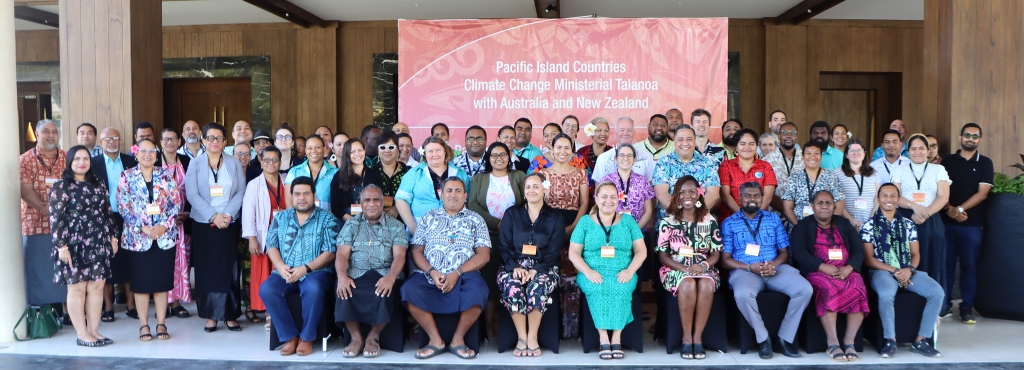Pacific Climate Change Officials gathering in Fiji to firm up and consolidate the Pacific’s thematic priorities on the road to the 29th Conference of the Parties to the UN Framework Convention on Climate Change (UNFCCC) in Azerbaijan later this year have been encouraged to work with negotiating partners to progress ambitious climate targets that have meaningful impacts for our Pacific communities.
Such ambitious climate targets should accelerate action on mitigation; ensure the Fund for Loss and Damage (FLD) delivers financing that supports country-led programmes to deliver simplified, direct access to funds; and conclude a New Collective Quantified Goal (NCQG) on Climate Finance that delivers increased, accessible finance that is grants-based, new and additional and distinguished from overseas development support (ODA).
“By no means will this be an easy task,” said Sanlan William, of Vanuatu, as Chair of the Pacific Small Island Developing States (PSIDS).
“We will continue to encounter the same challenges we faced in the lead up to and during COP28 and will likely have to navigate our way through a whole new host of challenges. This meeting is a chance for us to make certain our needs and views are incorporated into the relevant COP29 decisions.”
William, who is Vanuatu’s Deputy Permanent Representative to the United Nations, opened the pre-COP29 meeting of officials in Nadi. It’s an opportunity for negotiators to finalise the Pacific’s positions and messaging on priority thematic areas such as Finance (NCQG), Mitigation, Just Transition, Adaptation, Finance, Article 6, Oceans and Climate Change, Loss and Damage, Global Stocktake (GST) and Gender and Social Inclusion.
“Looking back at where we’ve come from, our PSIDS negotiators can feel proud of their efforts in negotiating across thematic priorities at both COP28 and in Bonn in June – aided by the co-ordinating support of our OneCROP colleagues,” said William.
“As PSIDS we worked tirelessly to try to advance our unique Pacific voice and priorities in Bonn. The session was marked by stonewalling and politicisation in almost every agenda item, although there was at least agreement on a process to develop indicators to measure progress in achieving the Global Goal on Adaptation.
“However other areas of work – notably mitigation and finance – featured little progress. At the same time, the expectations for landing a strong finance outcome, via the conclusion of the NCQG at COP29, continue to mount and the Azerbaijan Presidency has a huge effort on its hands to broker an outcome that keeps the 1.5 degree limit alive.”
The Pacific’s preparations for COP29 are taking place at a time where political dynamics are complex with significant economic and security challenges in play – including heightened tensions and worsening conflict and causalities as a result of both the Israel-Hamas and Russia-Ukraine wars. A suite of high profile and pivotal elections around the world during 2024 have added to the uncertainty and volatility of the geopolitical landscape ahead of COP29.
Despite these challenges, the PSIDS Chair remains optimistic and encouraged officials to be bold in their work, especially given what is at stake, the future of Pacific communities unfairly placed at the forefront of climate change impacts.
“I hope we can use this meeting to mobilise our expert negotiators to discuss, reflect and share ideas on how to chart the path towards Baku and to lay a platform for our Ministers, Political Climate Champions and Leaders to advance. Our work over the next two days will be an excellent opportunity to land our approach to the COP29 negotiations and give ourselves every chance to ensure our voice will be heard and our priorities will be met in Baku.”
Pacific Leaders continue to acknowledge climate change as the single greatest threat to the Pacific region, as emphasised in the Kainaki II and Boe Declarations, noting the region is facing a climate emergency that threatens the livelihoods, security and wellbeing of its people and ecosystems, backed by the latest science and the daily lived realities in Pacific communities.
The Pacific has played an active and prominent role in securing ambitious outcomes in international climate change negotiations under the UNFCCC. In part because of our unique vulnerabilities and the existential threats posed by climate change, PSIDS have emerged collectively as a strong and fair voice in global negotiations and will continue to work with other island states partners, as part of AOSIS, to advance our priorities at COP29.
The Secretariat of the Pacific Regional Environment Programme (SPREP), as Chair of the OneCROP, has the mandate as coordinator of Pacific climate change action to lead work on enhancing Pacific engagement in international climate change negotiations, under the UNFCCC. The OneCROP continues to work collaboratively with the Chair of PSIDS to support their collective aims in global climate discussions.
SPREP’s Director General, Sefanaia Nawadra, acknowledged the work of all Pacific officials in the ongoing climate change negotiations. As they gather in Fiji this week, Nawadra said: “This is one of the last opportunities to discuss the key thematic priorities for our Pacific countries. I encourage you all to use this time to refine your messages, taking into account what we have heard from our Ministers during the past few days here in Nadi.”
The 29th Conference of the Parties to the UN Framework Convention on Climate Change (UNFCCC) will take place from 11-22 November 2024 in Baku, the capital city of Azerbaijan.
The Pacific Small Islands Developing States (PSIDS) COP29 Preparatory Meetings from 30 September – 03 October 2024 at Crowne Plaza Fiji, is funded by the Government of Australia and facilitated by the Secretariat of the Pacific Regional Environment (SPREP). The meeting includes the Pacific Island Countries Climate Change Ministerial Talanoa with Australia and New Zealand.
The meetings will focus on the Pacific’s priority thematic areas for climate change negotiations and will allow for discussion on strategic directions and agreed regional positions ahead of COP29.














